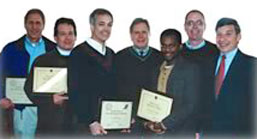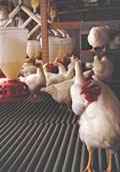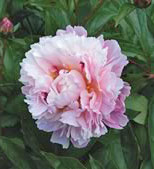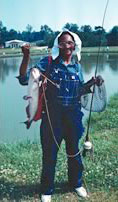Agricultural Economics and Rural Sociology (AGEC)
John Adrian, Chair
334-844-4800
www.ag.auburn.edu/agec

John Jensen, center, interim CoAg dean and
AAES director, and CoAg Associate Dean Bill
Hardy, right, stand with faculty members who
earned top honors from the college and the AAES
for 2003. Shown are, from left, Roger Lien, Dean's
Award for Advising Excellence; Joseph Giambrone,
Director's Senior Research Award; Jeff Sibley, Dean's
Award for Advising Excellence; Jensen; Norbert
Wilson, Director's Junior Research Award; Bill Moar,
Dean's Award for Teaching Excellence; and Hardy.
Norbert Wilson, assistant professor of AEC, received the Alabama Agricultural Experiment Station Director's Junior Research Award for the work he has conducted in the area of agricultural economics during his four years at Auburn. His work has focused on the economic impacts of international trade, biotechnology's influence on markets and the economic and trade effects of invasive species.
Professor James Novak was a member of the team receiving the Outstanding Public Issues Education Program Award that is sponsored by the Farm Foundation and the National Public Policy Education Committee. Title of the recognized program was "2002 National Extension Farm Bill Train-the-Trainer Education Program."
Diane Hite, who works in the natural resources and environmental economics area, recently was promoted to associate professor. Hite came to Auburn in fall of 2002 from Mississippi State University. Her graduate degree is from the Ohio State University's agricultural economics department and her undergraduate degree is from the Rhode Island School of Design.
Four AEC professors retired at the end of 2003 and all were recognized for their sustained meritorious service to Auburn by receiving professor emeritus titles. The retirees include Jerry Crews (with 27 years of service), John Dunkelberger (43 years of service), Glenn Howze (18 years of service) and Harry Strawn (34 years of service).
Biosystems Engineering (BSEN)
Steve Taylor, Head
334-844-4180
www.eng.auburn.edu/programs/bsen
John Fulton, who will be working in the precision agriculture and machine systems areas, joined the Biosystems Engineering (BIO) faculty in January 2004. Fulton received his Ph.D. from the University of Kentucky and has extensive experience in engineering for production agriculture. His position will have primary responsibilities in education and research. Other searches are under way for three new BIO faculty positions in the following areas: food and biological process engineering, land and water resources engineering and forest engineering.
Congratulations to BIO Professor Larry Curtis on his retirement in December from a distinguished career in extension and research in water resources and irrigation. Curtis will continue research in the department on a limited basis.

A BIO faculty member is working on using a low-cost diesel-powered electrical generator set to provide supplemental electrical power for poulty houses.
New biomass energy research and outreach projects in BIO have recently been funded by the Alabama Department of Economic and Community Affairs. In one project, Oladiran Fasina, assistant professor of BIO, is working with David Bransby, professor of agronomy and soils, to demonstrate the use of pelletized switchgrass and lespedeza as a fuel source that can be burned in pellet furnaces to heat greenhouses. In another project, Tim McDonald, associate professor of BIO, is working with Vinyard Technologies, of Hartford, Ala., to demonstrate the use of a low-cost diesel-powered electrical generator set to provide supplemental electrical power for poultry houses. In an innovative use of agricultural products, the generator set will be operated on recycled vegetable oil collected from restaurants, rather than diesel fuel.
BIO alumni and friends gathered on Nov. 8, 2003, before the Ole Miss football game to renew old friendships. Those in attendance included alumni from the first graduating class of agricultural engineering in 1939, a 1943 graduate and other graduates from each subsequent decade up through 2003. Alumni came from as far away as Wisconsin. If you are an alumnus or friend of Biosystems Engineering, begin making your plans to attend the gathering next fall.
BIO students received a major boost last fall with a gift to increase the William R. and Irene Gill Endowed Scholarship in Biosystems Engineering. This scholarship, which is available to BIO students, was established by the Gill family and emphasizes assistance for female students. William Gill's gift of more than $50,000 will result in a significant increase in scholarship funds that can be awarded to BIO students.
The Ginn College of Engineering will host its annual E-Day recruiting event on Feb. 27, 2004, on the Auburn campus. Middle- and high-school students are welcome to attend the event where different displays will highlight activities and career opportunities in Biosystems Engineering. For more information on Biosystems Engineering at Auburn, go to www.eng.auburn. edu/bio.
Horticulture (HORT)
Charles Gilliam, Chair
334-844-4862
www.ag.auburn.edu/hort
Jeff Sibley, alumni associate professor of HF, recently received a 2003 CoAg Dean's Award for Advising Excellence. Sibley is the official adviser for more than 50 students and an unofficial source of guidance and encouragement for dozens of other horticulture majors. He serves as adviser to the Ag Ambassadors and other student groups and was named 2003 Camp War Eagle Faculty Honoree.

Horticulture is looking for peonies that will tolerate heat and humidity.
The Department and its partners have launched a quest for the Southern peony. The goal of the peony project is to find peony species and cultivars that will tolerate the heat and humidity of the South and to develop best management practices for nurseries and landscapes. Bill and Faye Ireland of Birmingham, Ala., provided a gift of $48,000 to the AU Foundation and designated the funds for use in the peony project. The funds are targeted for the support of a two-year graduate student and the purchase and distribution of a private peony collection by January 2004 to the Birmingham and Huntsville Botanical Gardens and to other trial sites across the state. Helping HF with the project are the Alabama Agricultural Experiment Station's Brewton and Cullman experiment fields, the Wuhan (China) Institute of Botanical Sciences, the Birmingham and Huntsville Botanical Gardens. Others involved in the project include nurseries and private individuals in Lawrenceville and LaGrange, Ga., Birmingham and Auburn, Ala., and Charleston, S.C. Follow the quest for the Southern peony on the web site www.ag.auburn.edu/landscape.
The Department's annual Horticulture Welcome Day was held last October at the Paterson Greenhouse Complex on the Auburn campus. This event allows students and their parents to interact with HF faculty, staff, alumni and administration. Some 200 people attended, including AU Board of Trustee Golda McDaniel. This year HF alumni provided donations to cover the cost of the entire event.
The first annual Henry P. Orr Memorial Golf Classic was held last November to benefit the Henry P. Orr Endowed Fund for Horticultural Excellence and was a rousing success. The tournament raised $16,000 and a silent auction held in conjunction with the tournament raised another $3,800. The event, which drew some 62 golfers, was held at FarmLinks Golf Course on Pursell Farms in Fayetteville, Ala. This year's tournament is already scheduled for Oct. 22, 2004.
Agronomy and Soils (AGRN)
Joe Touchton, Head
334-844-4100
www.ag.auburn.edu/agrn
Wilson Faircloth, an AY Ph.D. student, won first place in the inaugural Cotton Weed Science Research Conference's graduate student paper contest with his presentation entitled "Weed Population Dynamics Under Glyphosate-resistant Cotton Cropping Systems." This research was conducted at the Tennessee Valley Research and Extension Center in Belle Mina and the E.V. Smith Research Center in Shorter with significant funding provided by checkoff funds from Alabama cotton growers and supported through Cotton Incorporated. Faircloth, who was honored this spring as one of 10 distinguished doctoral students for 2002-2003 by the AU Graduate School, also recently authored Alabama Cooperative Extension System publication ANR-1241, "Wanted Dead, Not Alive: Cogongrass," which is available through Extension Publications, Extension Annex, Auburn University, AL 36849, or online at www.ag.auburn.edu/ay/cogongrass.
Professor David Weaver was selected by the College to participate in the Experiment Station Committee on Organization and Policy/Academic Committee on Organization and Policy (ESCOP/ACOP) Leadership Development Program, along with 66 other participants from throughout the U.S. The program consists of a week of intensive training related to the development of leadership skills. As part of the program, participants return to their respective institutions, select a mentor administrator and develop a relevant project aimed at improving some aspect of the workings of the Experiment Station or College. For his project, Weaver is assisting in the development of a Strategic Plan for the Alabama Agricultural Experiment Station.
During the past year, Weaver also was selected as CoAg's Outstanding Faculty Member by the AU Student Government Association. This is an award presented annually by AU students to an Auburn faculty member in each college or school who they feel has made the most contributions to student development, both inside and outside the classroom.
AY Professor Jim Hairston and Program Associate Eve Brantley received a $152,000 U.S. Department of Agriculture water quality grant recently for a stream restoration project. The grant is part of $12 million in grants awarded to 22 institutions nationwide to conduct research, education and extension programs aimed at improving the quality of the nation's water resources.
Entomology and Plant Pathology (ENTM)
Mike Williams, Chair
334-844-5006
www.ag.auburn.edu/enpl
ENTPLP Associate Professor Bill Moar recently received the 2003 CoAg Dean's Award for Teaching Excellence. Moar, who has taught seven different entomology courses since joining the AU faculty in 1990, was cited for his genuine enthusiasm for his subject and his ability to get his students interested, motivated and involved.
A graduate-level course offered through ENTPLP is giving tomorrow's research scientists a definite edge in the competition for extramural research funding. Research Proposal Writing (PLPA 7820) takes students through the grant-writing process, with each student selecting a research proposal topic shortly after the semester begins and submitting a full grant proposal by the end of the course. All grant proposals are then evaluated by a mock National Research Initiative (NRI) competitive grants program review panel comprised of students in the class.
"Often, the first challenge graduate students face after receiving their Ph.D. is to write a grant proposal to get their research funded, but most of the time, they haven't had any specific prior training in how to do that," says Joe Kloepper, the CoAg plant pathology professor who developed the class. "This course prepares them to write proposals that will be more competitive in attracting outside funding." As one who has served on NRI review panels and as a panel manager, Kloepper also offers students valuable insight from inside the review process.
Poultry Science (POUL)
Don Conner, Head
334-844-4133
www.ag.auburn.edu/poul
Auburn is well represented in the U.S. Department of Agriculture's Higher Education Challenge Grants program, which funds new teaching methods/topics in agriculture. PH received several grants from this program, illustrating that CoAg scientists are on the cutting edge of agricultural higher education. The projects funded for PH include one that focuses on materials for safer food, led by Professor and Department Head Don Conner. Another is entitled "The Virtual Chicken" and is headed by PH Professor Patricia Curtis. The third is a project to develop a Web-based poultry science course/curriculum and is headed by Assistant Professor Shelly McKee.
Associate Professor Roger Lein recently received a 2003 CoAg Dean's Award for Advising Excellence. Lein, who serves as undergraduate program coordinator for PH, works closely with poultry science students before, during and after their time at Auburn. He directs advising, recruiting and curriculum development. In addition, he assists with scholarship and internship programs, advises the student Poultry Science Club and facilitates interaction between prospective graduates and employers.
The Poultry Science Department will be conducting Poultry Career Development Events (PCDEs) as a means to meet high school students interested in poultry science careers. The FFA Poultry Career Development events are the department's primary undergraduate recruiting emphasis. Faculty members Roger Lien, Joe Hess, John Blake and Bob Voitle along with Research Assistant Frank Dillman attend the district contests (South, Central and North Alabama) with their "traveling road show." Qualifying teams are invited to the State PCDE. The high scoring team from the State PCDE advances to the national competition in the fall of 2004. Agriscience teachers interested in starting or contributing to their existing poultry judging program are welcome to participate in the department's Poultry Inservice Shortcourse this summer. For more information contact the Agriscience Education office at 334-844-5595. High school students interested in obtaining a poultry science degree should contact Lien, rlien@acesag.auburn.edu, for assistance with scholarship eligibility and application process, AU enrollment and course selection.
Assistant Professor Shelly McKee served in 2003 on the National Research Initiative Competitive Grants Program (NRICGP) panel to peer review food safety research proposals. McKee and her fellow panelists waded through 111 proposals and she was praised by the NRICGP coordinators for her valuable advice and recommendations.
Professor Joseph Giambrone was presented the Alabama Agricultural Experiment Station (AAES) Director's Senior Research Award in recognition of the significant contributions he has made to the poultry industry in his 26 years as an AAES scientist. His exceptional contributions to the commercial poultry industry include developing numerous detection tests and vaccines for viral diseases of poultry.
The new poultry science building is expected to be completed in late June or early July 2004.
The PH Peaks of Excellence program was reviewed in November 2003 and reviewers gave the AU Poultry Products Safety and Quality Program high marks for its accomplishments to date. A report from the outside reviewers has been forwarded to AU administration.
The department participated in the International Poultry Exhibition in Atlanta in January 2004.
Animal Sciences
Lowell Frobish, Chair
334-844-4160
www.ag.auburn.edu/ansc
Frank "Skip" Bartol, an AS professor, recently was named congressional liaison for the Society for the Study of Reproduction (SSR). He will be representing the SSR to Congress on any matters dealing with reproduction and reproductive health. Bartol also received a National Research Initiative grant for $297,000 for the study of the interaction between various endocrine disruptors and uterine estrogen receptors and their ultimate effect on later reproduction.
Becky Tarleton, a former AS graduate student who is currently working in a post-doctoral position at Yale, received an AU Graduate School's Outstanding Student Award for 2003. Tarleton's research and dissertation were directed by Bartol.
Professors Buelon "Pete" Moss and William "Bill" Jones, Associate Professor Robert "Butch" Blaylock and Agricultural Technician Clinton Dowdell all retired from the department on Dec. 31, 2003. The retirees were honored last year at a reception held at the Alabama Cattlemen's Association office in Montgomery. These individuals contributed more than 100 years of service to Auburn University.
Bob Ebert, AS Extension specialist, is making plans for the 2004 Alabama Junior Beef Expo that includes a special Ultrasound Steer Show. The Ultrasound Steer Show began in 2002 as a way to expose young people to the use of ultrasound technology as a modern livestock selection method. Ultrasound is commonly used in genetic evaluation of breeding animals for seedstock producers and is often used in the selection of market cattle at harvest time in many Midwestern feedlots. More and more 4-H members are taking advantage of the ultrasound show and participation is expected to increase in 2004.
Construction plans for the Swine Research and Education complex are in the final stages. The new complex will be constructed at the site of the current swine facilities located on Shug Jordan Parkway on the AU campus and will include modern production facilities and a new research laboratory. These state-of-the-art facilities will enhance the undergraduate instructional programs and support biomedical research. The research laboratory provides Auburn University the leadership in the development of extramural research projects with other universities and research organization. Funds for the project are provided through the Agricultural Bond issue.
A memorial fund has been established in memory of CoAg alumnus Bob Anderson, who was a member of the AU Meats Judging Team in the 1970s. Anderson's family established the fund in his name to benefit the new Meats Laboratory. Contributions can be made to the Bob Anderson Memorial Fund via Chris Gary, Development Officer, Comer Hall, Auburn University, AL 36849. For more information, contact Gary at 334-844-1136 or garychr@auburn.edu.
Fisheries and Allied Aquaculture (FISH)
David Rouse, Interim Head
334-844-4786
www.ag.auburn.edu/dept/faa/
FAA Professor Claude Boyd recently received the Annual Service Award from the Catfish Farmers of America for his work in developing best management practices for aquaculture to satisfy state and federal water quality standards. Boyd also organized and led the second Butler/Cunningham Conference on Agriculture and the Environment in November 2003.

Anglers now can use the biodegradable fishing worms.
FAA Associate Professor Rusty Wright and other AU faculty members have been involved with the development of a new biodegradable fishing worm that is now on the market. FoodSource Lures, a Birmingham-based firm, teamed with Auburn scientists to commercially produce and market an artificial fishing lure made from food products. Because it is made of ingredients that fish naturally feed on, the AU lure is more enticing than plastic bait to lunkers awaiting to ambush a meal. And, because the AU lure–unlike traditional plastic bait–is biodegradable, it also may be more enticing to environmentally conscious anglers. The product is being featured through many print and broadcast outlets, including a Field & Stream magazine article. Wright was helped by AU College of Human Sciences faculty Jean Weese and Leonard Bell. Excitement over the lures is running high among anglers and the industry, which could be good news for Auburn. "We're hoping this will be our version of Gatorade," notes Wright. More information on the lures is available at www.fslures.com.
An educational game that FAA Professor Bill Deutsch developed through the Alabama Water Watch (AWW) program will be commercially produced and sold throughout school systems in the US. The card game that simulates a biological assessment of a stream and a watershed evaluation in the classroom has been used in AWW training workshops. The LaMotte Company (the company that makes AWW's test kit) and Deutsch have been modifying the original game for the last several months, to make it simpler and less expensive. The new game is called "Macro Mania." AU has recently completed a licensing agreement with LaMotte to produce the game.
AWW also received $550,000 from the U.S. Department of Agriculture to do research, education and extension activities regarding concentrations and loading rates of phosphorus and nitrogen in the Tallapoosa River Basin. Deutsch is project director for a team of scientists from AU, the University of Alabama, the Alabama Department of Education, the Alabama Cooperative Extension System's Tallapoosa County coordinator and citizens of Lake Watch of Lake Martin. Standard Methods chemical analyses will be conducted by FAA Professor David Bayne's laboratory. These results will be compared with the simpler techniques of AWW that will be used by the Lake Watch of Lake Martin citizen group. University of Alabama geographer Luoheng Han will use remote sensing and spectral analyses from satellite imagery. The team will perform a cost-benefit analysis of the research methods, and combine that with their methods of formal and informal education/extension to produce a transferable model that they hope is appropriate for other watersheds.
